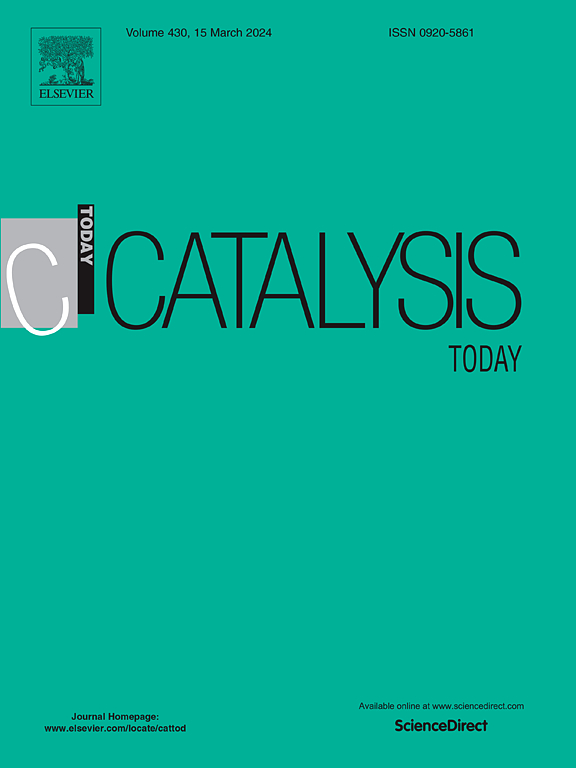Selective carboxylation of alkenes with CO2 to form unsaturated carboxylic acid on Sc-exchanged MFI zeolite
IF 5.3
2区 化学
Q1 CHEMISTRY, APPLIED
引用次数: 0
Abstract
Utilization of CO2 in chemical synthesis as C1 carbon feedstock to introduce a carboxylic group into alkene is valuable for producing unsaturated carboxylic acids. Selective carboxylation of alkenes at targeted positions can be used to regulate the production of such specific unsaturated carboxylic acids or functionalize hydrocarbon plastics that possess residual C![]() C double bonds. In this study, we investigated the carboxylation of 1-butene and 2-butene (as representative alkene) with CO2 on Sc-exchanged MFI zeolites using density functional theory calculations. We find that similar to ethylene, the carboxylation of butene is also rate-limited by the β─H transfer. We examined carboxylation at the C1 and C2 positions of 1-butene and cis and trans isomers for 2-butene. Based on activation barriers of the β─H transfer, our results demonstrate that Sc-MFI zeolite preferably carboxylates at the terminal position of butene. In the case of 2-butene, carboxylation of the trans isomer is more favorable than the cis isomer. Furthermore, We show that the energy of degenerate orbitals of C, O and H atoms (involved in the β─H transfer) in the metallalactone ring regulates the activation energy of the β─H transfer.
C double bonds. In this study, we investigated the carboxylation of 1-butene and 2-butene (as representative alkene) with CO2 on Sc-exchanged MFI zeolites using density functional theory calculations. We find that similar to ethylene, the carboxylation of butene is also rate-limited by the β─H transfer. We examined carboxylation at the C1 and C2 positions of 1-butene and cis and trans isomers for 2-butene. Based on activation barriers of the β─H transfer, our results demonstrate that Sc-MFI zeolite preferably carboxylates at the terminal position of butene. In the case of 2-butene, carboxylation of the trans isomer is more favorable than the cis isomer. Furthermore, We show that the energy of degenerate orbitals of C, O and H atoms (involved in the β─H transfer) in the metallalactone ring regulates the activation energy of the β─H transfer.
碳交换MFI沸石上烯烃与CO2选择性羧化生成不饱和羧酸的研究
利用CO2作为C1碳原料在烯烃中引入羧基,对制备不饱和羧酸具有重要意义。烯烃在目标位置的选择性羧化可用于调节这种特定不饱和羧酸的生产或功能化具有残余CC双键的碳氢化合物塑料。在本研究中,我们使用密度泛函理论计算研究了1-丁烯和2-丁烯(代表烯烃)在sc交换的MFI沸石上与CO2的羧化反应。我们发现丁烯的羧基化与乙烯类似,也受到β─H转移的速率限制。我们研究了1-丁烯在C1和C2位置的羧基化,以及2-丁烯的顺式和反式异构体。基于β─H转移的激活屏障,我们的研究结果表明,Sc-MFI沸石在丁烯的末端位置更容易羧化。在2-丁烯的情况下,反式异构体的羧基化比顺式异构体更有利。此外,我们还发现金属内酯环中参与β─H转移的C、O和H原子的简并轨道能量调节β─H转移的活化能。
本文章由计算机程序翻译,如有差异,请以英文原文为准。
求助全文
约1分钟内获得全文
求助全文
来源期刊

Catalysis Today
化学-工程:化工
CiteScore
11.50
自引率
3.80%
发文量
573
审稿时长
2.9 months
期刊介绍:
Catalysis Today focuses on the rapid publication of original invited papers devoted to currently important topics in catalysis and related subjects. The journal only publishes special issues (Proposing a Catalysis Today Special Issue), each of which is supervised by Guest Editors who recruit individual papers and oversee the peer review process. Catalysis Today offers researchers in the field of catalysis in-depth overviews of topical issues.
Both fundamental and applied aspects of catalysis are covered. Subjects such as catalysis of immobilized organometallic and biocatalytic systems are welcome. Subjects related to catalysis such as experimental techniques, adsorption, process technology, synthesis, in situ characterization, computational, theoretical modeling, imaging and others are included if there is a clear relationship to catalysis.
 求助内容:
求助内容: 应助结果提醒方式:
应助结果提醒方式:


